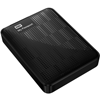- Qualcomm Launches Snapdragon 4 Gen 2 Mobile Platform
- AMD Launches Ryzen PRO 7000 Series Mobile & Desktop Platform
- Intel Launches Sleek Single-Slot Arc Pro A60 Workstation Graphics Card
- NVIDIA Announces Latest Ada Lovelace Additions: GeForce RTX 4060 Ti & RTX 4060
- Maxon Redshift With AMD Radeon GPU Rendering Support Now Available
Western Digital My Passport 2TB Portable Hard Drive Review

Need big storage on the go, but refuse to lug about a full-sized hard drive enclosure? If the term “2TB” sound good to you, then Western Digital’s got you covered. The company recently updated its My Passport line to include the beefiest storage possible in such a small enclosure, so join us as we take a look at just what it’s made of.
Page 3 – Test System & Methodology; Iometer, HD Tune Pro & PCMark Vantage
For most of our performance-type content, we hold nothing back when explaining our methodologies and beliefs. But as this is simply an external storage review, we don’t feel there’s quite as important a need to do that. If you’ve read our other performance content, you already know how seriously we take our testing practices, as it’s obvious that coming up with an accurate end score for any benchmark is very important. In the case of flash drives, we repeat all tests at least twice to verify that our results are accurate.
|
Component
|
Model
|
| Processor |
Intel Core i7-980X – Six-Core, 3.33GHz, 1.30v
|
| Motherboard |
Gigabyte GA-X58A-UD5 (Rev 1.0) – X58-based, F5 BIOS
|
| Memory |
Kingston HyperX – 12GB DDR3-1333 7-7-7-24-1T, 1.60v
|
| Graphics | NVIDIA GeForce GTX 580 1.5GB – GeForce 275 |
| Audio |
On-Board Audio
|
| Storage |
Corsair Force F160 160GB – (Data Transfer > USB Device & OS) |
| Power Supply | |
| Chassis |
Corsair Obsidian 800D
|
| Display |
Dell 24" 2408WFP
|
| Cooling |
Corsair H60
|
| Et cetera |
For our real-world transfer tests, the source files are stored on Corsair’s Force F160 160GB solid-state disk, which avails us a top-end read speed of around 285MB/s. Unless the USB device we’re testing with is able to write in excess of that, there should be no bottleneck.
Iometer 2006.07.27
To start things off, we’re using Iometer, a popular storage benchmarking application that’s as effective as it is customizable. It’s for both of those reasons that we choose to use it, and also thanks to the fact that it’s capable of outputting the results to both MB/s and IOPS (in/out operations per second). The latter is the value we focus on, as it’s become a standard for measuring performance in enterprise/IT environments.
Admittedly, running this test on most USB flash drives, especially 2.0 models, is not entirely important given the typical manner they’re used, but it’s our goal to see where one excels over another when dealing with such an intensive test. IOPS performance would be very important if you were to install an OS on a flash drive, as long as the bandwidth throughput is also good.



To be fair to WD’s drive, Iometer is better for testing out flash media, but for the sake of giving all drives a good test, we love coming back to this one. Compared to Seagate’s external 3.5″ 3TB drive, WD’s My Passport performs just as we’d expect it to, especially given its ~5300 RPM speed.
HD Tune Pro 3.5
One of the simplest methods for testing storage is with HD Tune, and as it’s able to give reliable and repeatable results, we like using it in our testing. Although the program offers a good range of testing methods, we use the basic test that gives us read speeds and also access latencies.


In USB 3.0 mode, the drive performs much like a hard drive right in a laptop, capping out at about 110MB/s and averaging out at 84.8MB/s. There’s no trade-off of performance to get the drive as big as it is storage-wise.
PCMark Vantage
One of the more popular storage benchmarks currently is Futuremark’s PCMark Vantage. Even though this is a suite designed to benchmark your entire machine, it’s HDD suite test is quite robust and is good at delivering scores that scale well with the storage device you are benchmarking. Almost all of the storage companies we deal with regularly recommend using it, so we do.

Much like Iometer, mechanical hard drives can’t compete with SSDs in PCMark, and it shows here. It’s important to note, however, that a mobile hard drive plugged straight into a computer would yield similar results. Flash media has the major advantage of ultra-low latencies that just aren’t possible in mechanical storage.
Support our efforts! With ad revenue at an all-time low for written websites, we're relying more than ever on reader support to help us continue putting so much effort into this type of content. You can support us by becoming a Patron, or by using our Amazon shopping affiliate links listed through our articles. Thanks for your support!





